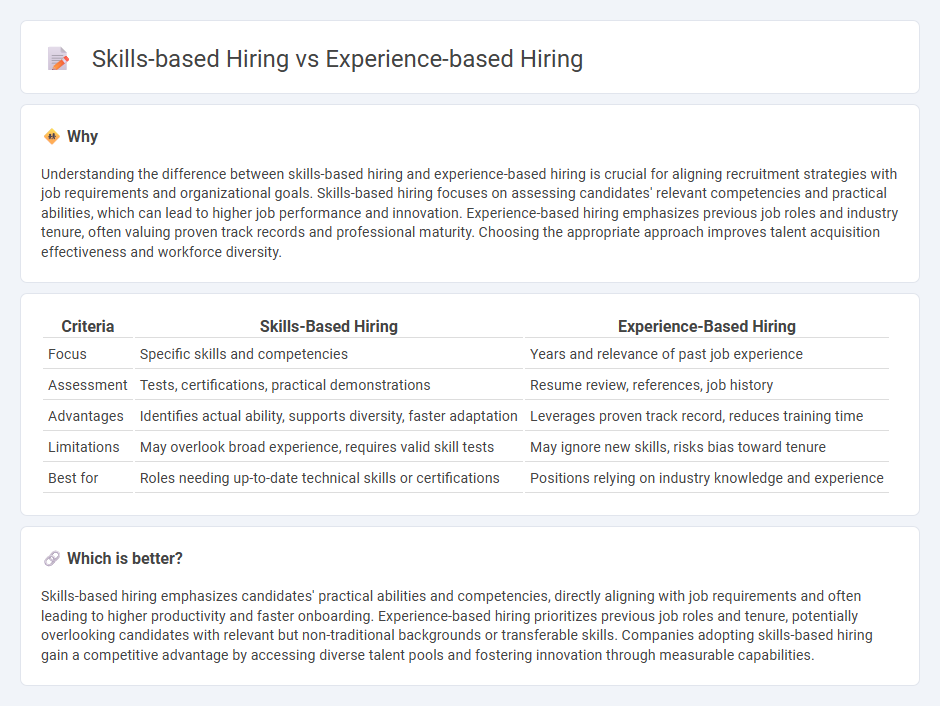
Skills-based hiring emphasizes candidates' practical abilities and specific competencies directly relevant to job performance, fostering diverse talent acquisition and reducing unconscious bias. Experience-based hiring relies on candidates' prior job roles and years in the field, often valuing tenure over measurable skills, which may limit innovation and overlook transferable talents. Explore how integrating skills assessments can transform recruitment strategies and improve organizational outcomes.
Why it is important
Understanding the difference between skills-based hiring and experience-based hiring is crucial for aligning recruitment strategies with job requirements and organizational goals. Skills-based hiring focuses on assessing candidates' relevant competencies and practical abilities, which can lead to higher job performance and innovation. Experience-based hiring emphasizes previous job roles and industry tenure, often valuing proven track records and professional maturity. Choosing the appropriate approach improves talent acquisition effectiveness and workforce diversity.
Comparison Table
| Criteria | Skills-Based Hiring | Experience-Based Hiring |
|---|---|---|
| Focus | Specific skills and competencies | Years and relevance of past job experience |
| Assessment | Tests, certifications, practical demonstrations | Resume review, references, job history |
| Advantages | Identifies actual ability, supports diversity, faster adaptation | Leverages proven track record, reduces training time |
| Limitations | May overlook broad experience, requires valid skill tests | May ignore new skills, risks bias toward tenure |
| Best for | Roles needing up-to-date technical skills or certifications | Positions relying on industry knowledge and experience |
Which is better?
Skills-based hiring emphasizes candidates' practical abilities and competencies, directly aligning with job requirements and often leading to higher productivity and faster onboarding. Experience-based hiring prioritizes previous job roles and tenure, potentially overlooking candidates with relevant but non-traditional backgrounds or transferable skills. Companies adopting skills-based hiring gain a competitive advantage by accessing diverse talent pools and fostering innovation through measurable capabilities.
Connection
Skills-based hiring and experience-based hiring both aim to identify qualified candidates, but skills-based hiring focuses on specific competencies regardless of job tenure, while experience-based hiring values the duration and relevance of past roles. Employers increasingly integrate assessment of practical skills alongside professional history to ensure candidates meet role requirements effectively. This combined approach enhances workforce quality by balancing measurable abilities with proven job experience.
Key Terms
Credentials
Experience-based hiring emphasizes candidates' past job roles and industry tenure as proof of competence, often prioritizing years of service and specific company backgrounds. Skills-based hiring targets demonstrable capabilities and technical proficiencies, assessing applicants through practical tests and certifications rather than traditional resumes. Explore the key differences and benefits of each approach to optimize your recruitment strategy.
Competencies
Experience-based hiring emphasizes candidates' past job roles and tenure as primary indicators of their suitability, often prioritizing length of service over actual competencies. Skills-based hiring targets specific abilities and technical proficiencies, ensuring alignment with the job's demand for particular competencies such as problem-solving, communication, and adaptability. Explore the differences in hiring strategies to understand which approach best enhances workforce competence and productivity.
Transferable Skills
Experience-based hiring emphasizes candidates' previous job roles and industry tenure, often overlooking versatile competencies. Skills-based hiring prioritizes transferable skills such as communication, problem-solving, and adaptability, which enhance long-term employee success across various positions. Explore how focusing on transferable skills can optimize your hiring strategy for a resilient and agile workforce.
Source and External Links
Skills-based Hiring: Stop Hiring for Experience - Experience-based hiring focuses on a candidate's job or educational history, but skills-based hiring prioritizes aptitudes and abilities over traditional experience, recognizing that pedigree and past titles don't always predict job performance or fit within a company culture.
A Skills-Based Hiring Guide - Skills-based hiring is especially critical for early-career professionals who may lack extensive work experience but possess relevant skills, and it helps organizations focus on candidates' potential rather than traditional resume criteria such as degrees or past roles.
The Strategic Guide to Skills-Based Hiring for a ... - Skills-based hiring prioritizes specific skills and competencies over surface credentials like degrees or job titles, helping organizations align workforce capabilities with business needs and fostering adaptability in talent acquisition.
 dowidth.com
dowidth.com